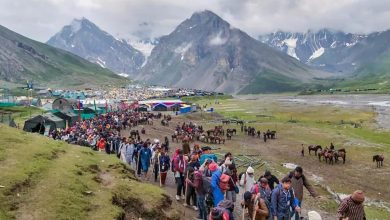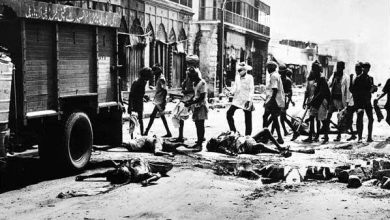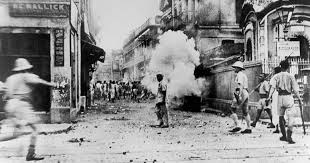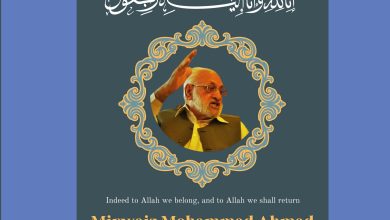Article: November 6: A Day of Remembrance for the Victims of the Jammu Massacre
Abdul Rehman Gondal
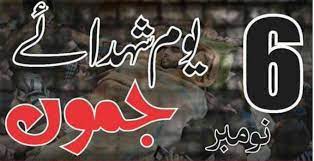
 November 6 is a solemn day of remembrance for the people of Jammu, honoring the lives lost during the 1947 massacre that remains one of South Asia’s darkest and least acknowledged chapters. On this day, over 200,000 Muslims in Jammu and Kashmir were brutally slaughtered like animals in one of the largest post-World War II genocides. These innocent lives were taken amid an era that saw many nations championing human rights and pledging to prevent atrocities; however, the tragedy in Jammu occurred with little international intervention, leaving survivors and descendants of the victims to carry the memory alone.
November 6 is a solemn day of remembrance for the people of Jammu, honoring the lives lost during the 1947 massacre that remains one of South Asia’s darkest and least acknowledged chapters. On this day, over 200,000 Muslims in Jammu and Kashmir were brutally slaughtered like animals in one of the largest post-World War II genocides. These innocent lives were taken amid an era that saw many nations championing human rights and pledging to prevent atrocities; however, the tragedy in Jammu occurred with little international intervention, leaving survivors and descendants of the victims to carry the memory alone.
The horrors of the Jammu Massacre share a tragic parallel with Nazi atrocities during WWII, a time that saw concentration camps, gas chambers and ethnic purges. The international community had vowed “never again” after the Holocaust and world leaders resolved to prevent future genocides. However, the people of Jammu saw little evidence of this resolve. As British rule ended, India and Pakistan grappled with an unresolved issue of princely states’ allegiances, including that of Jammu and Kashmir. The Muslim-majority population in Kashmir sought to join Pakistan, but Maharaja Hari Singh, the Hindu ruler of the region, made the controversial decision to illegally accede with India, going against the wishes of his people. When unrest spread as Kashmiris demanded self-determination, Maharaja’s forces responded with unrestrained violence, inflicting indiscriminate bloodshed on Muslim civilians and intensifying social tensions.
The massacre took place in an atmosphere of communal hostility and institutional bias, which saw Muslims being expelled from government and police positions, effectively stripping them of any means of protection. Many Muslim families who attempted to flee to Pakistan were stopped by Maharaja’s forces and other extremist groups, such as the RSS, who perpetrated severe violence. Refugees sought shelter at police stations only to be handed over to hostile forces. As The Times of London reported, “237,000 Muslims were systematically exterminated, unless they escaped to Pakistan along the border, by the forces of the Dogra State headed by the Maharaja in person and aided by Hindus and Sikhs.” These ruthless actions nearly halved the Muslim population in the region, reducing it from 80% to about 33%, thus drastically altering the demographics.
Despite the magnitude of the violence, the Jammu Massacre remains largely absent from global historical narratives on the partition, overlooked by international actors despite Pakistan’s efforts to bring it to light. The current political situation in Jammu and Kashmir still reflects elements of this tragic past. Hindu nationalist movements have gained momentum, often promoting policies that undermine the Muslim-majority population. In August 2019, the Indian government abrogated Articles 370 and 35A, removing Jammu and Kashmir’s special autonomy and enabling greater integration with India. To many, these policies signal a continuation of hardened communal ideologies that exclude or marginalize the region’s original inhabitants. Indian leaders must take lessons from history, recognizing the need for a diplomatic approach that respects the people’s right to self-determination, rather than imposing policies that evoke memories of past oppressions.
Both India and Pakistan would benefit from a platform for sustained, honest dialogue over the Kashmir dispute. Former Pakistani President Pervez Musharraf proposed a four-point agenda for resolving Kashmir, which initially showed promise as a pathway for peace. However, the Indian government’s reluctance to follow through, combined with entrenched political tensions, has prevented substantial progress. Regional organizations, such as the Shanghai Cooperation Organization (SCO) and the South Asian Association for Regional Cooperation (SAARC), could play a crucial role in facilitating peace talks, providing a neutral space for diplomacy.
The spectre of conflict remains high as both nations are nuclear-armed, making the risks of escalation far greater. Military conflict cannot offer a resolution in an age where both nations possess devastating weaponry. With each state’s security interests intertwined, an honest and sustainable peace requires an approach grounded in mutual respect, regional stability and a willingness to address the historical trauma that continues to influence generations.
As the anniversary of November 6 approaches, both countries stand at a critical juncture. Recognizing the 1947 Jammu Massacre’s significance and the pain it has embedded within generations is essential for creating a new paradigm of trust and reconciliation. Addressing this atrocity through diplomatic channels would help validate the survivors’ experiences, foster understanding and help both nations envision a peaceful, cooperative future for the region. For the people of Jammu, their descendants and all those who continue to advocate for justice, a commitment to peace and historical accountability is the only path forward.
Abdul Rehman is student of International Relations at National Defence University and intern at Kashmir Institute of International Relations.





